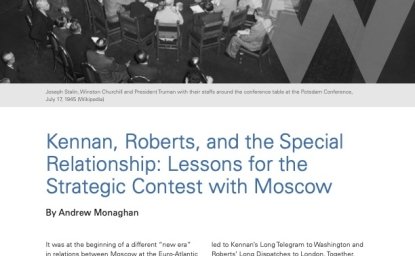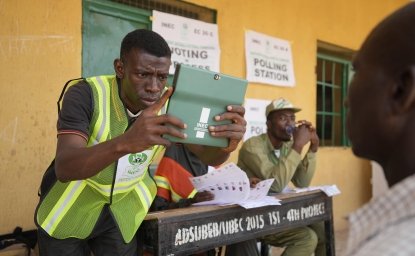 The Wilson Center's History and Public Policy Program and the Center for Russian Studies at Bilkent University hosted a workshop this past fall to recognize collaboration and partnership between the two organizations and to explore new archival sources in and on the Middle East.
The Wilson Center's History and Public Policy Program and the Center for Russian Studies at Bilkent University hosted a workshop this past fall to recognize collaboration and partnership between the two organizations and to explore new archival sources in and on the Middle East.
The workshop consisted of three panels, each with three presenters followed by a question and answer period. Opening remarks were delivered by Erinç Yeldan of Bilkent University and the Wilson Center's Christian F. Ostermann and Kian Byrne.
The first panel included Sergey Radchenko (Cardiff University), Daniela Richterova (Brunel University London), and Asher Orkaby (Princeton University). Dr. Radchenko's presentation, The Yom Kippur War: New Evidence on the Soviet Involvement explored the evolution of Soviet policy in the Middle East in 1972-1973, looking in particular at the Soviet motivations in the lead-up and during the October/Yom Kippur War of 1973. Dr. Richterova presented on the relationship between Carlos the Jackal and a number of Arab embassies based in prague during the Cold War. Liasons Behind the Iron Curtain: Carlos the Jackal and Middle Eastern Diplomats argued that a number of Prague's Middle Eastern allies violated their diplomatic privileges as defined by the 1961 Vienna Convention in order to aid their violent non-state partner. The final presentation of the first panel, Revisiting a Civil War in Yemen: From the Individual to the International by Asher Orkaby, explained the necessity of using remote and relatively inaccessible archives to better understand a transformational historical moment in the history of Yemen.
The second panel featured three more speakers: Barin Kayaoglu (American University of Iraq, Suleimani), Iran's Cold War: From Weak Client State to Ambitious Regional Hegemon to Proud and Able Pariah; Guy Laron (Hebrew University of Jerusalem), Soviet Involvement in the War of Attrition (11969-1970); Or Rabinowitz (Hebrew University of Jerusalem), Israel's Participation in Reagan's SDI: 'It's a long, long road?' In Dr. Kayaoglu's presentation, he mapped Iran's trajectory in the Cold War, beginning with it's period of general neutrality, followed by aligning with the US-led Western camp, and finally becoming an international pariah, though one that succesfully pursued its foreign policy objectives in the region. Dr. Laron then posed the question: "Why did the Soviet Union send a 10,000 strong expeditionary force to Egypt in March 1970?" To answer this complex question, he outlined the context of Soviet and Egyptian decision making to show there was a direct link between Israel's actions and Soviet reactions. To conclude the panel, Dr. Rabinowitz showed how Israel's 1985 invitation to participate in the Reagan administration's SDI initiative outlined the administration's growing motivation to 'weave' Israel into its strategic plans to counter Soviet influence in the Middle East. In doing so, Israel was cemented as a key regional strategic ally for the Reagan administration.
The last panel of the day featured three representatives from Bilkent University, İlker Aytürk, Onur Işçi, and Samuel Hirst. Dr. Aytürk, Islam, Labor and Socialism in Turkey: The Cold War Legacy, turned the spotlight on the Turkish ulema in an attempt to analyze why Turkish interpreters of sharia were, overall, anti-labor and did not support workers' rights, whereas more labor-friendly interpretations of sharia did elsewhere in the Muslim world. He argued that the reluctance of the Turkish ulema to address labor questions and - when they had to- their neo-liberal refusal to empower the workers reflected Cold War concerns in Turkish domestic politics. Soviet Oil for Turkish Oranges: Soviet Economic Involvement in the Middle East, Dr. Hirst's presentation, explained that the Soviet Union's investments in the Middle East began long before the Cold War and the ealier history tells us much about the process that accelerated in the 1950s and 1960s. In fact, this ealier framework, which was more akin to exchange among equals, is important to balance an understanding that emphasizes the Soviet Union's role as a superpower in the Middle East. Dr. Işçi put a cap on the workshop with his presentation, Non-Aligned? Turkish Diplomacy and the Cold War, looking at the defining moment in Soviet-Turkish relations during the Cold War, when representatives of the two states signed an agreement in 1967 according to which the Soviet Union was to build seven industrial plants in Turkey. His paper demonstrated why Turkey's successive governments - from both the left and right ends of the political spectrum - continued to support the idea that Turkey should ally with both Moscow and Washington, and, in the case of conflict between the two, attempt to stay netural.





